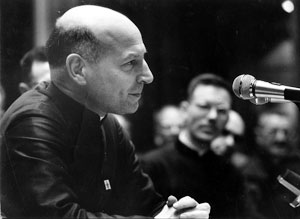Father de Nantes’ School of Thought
FATHER Georges de Nantes, the theologian of the Catholic Counter-Revolution, always considered this Counter Reformation battle that he was leading to be his primary task, given the state of apostasy into which the Church was foundering in the last half of the 20th century. He realised, nevertheless, that in order for the Church to recover from such a collapse, for a Catholic Renaissance to take place, a doctrinal renewal was required. He therefore set out to found a school of thought, the essential element of which was his relational metaphysics, a philosophical intuition that he had as a young man. This metaphysics can be applied in many fields, opening up vast perspectives for the theological, mystical, moral and political renewal that our time needs.
 Thus, while fighting apostasy on the one hand, Father de Nantes was actively developing his positive Catholic Renaissance doctrine. He did so for twenty-five years (1971-1996), in monthly public lectures given at the “Mutualité”, a conference hall well-known to Parisians, now made famous by these lectures. Each year, Father de Nantes chose a theme for his lectures, often corresponding with events of the moment. Each year’s series of lectures added a brick to a doctrinal edifice that conserved the Church’s traditional doctrine, while enriching it with all the contributions that the modern sciences can offer. Retreats and sessions at Maison Saint-Joseph, as well as summer camps also provided Father de Nantes further occasions for expounding his doctrine.
Thus, while fighting apostasy on the one hand, Father de Nantes was actively developing his positive Catholic Renaissance doctrine. He did so for twenty-five years (1971-1996), in monthly public lectures given at the “Mutualité”, a conference hall well-known to Parisians, now made famous by these lectures. Each year, Father de Nantes chose a theme for his lectures, often corresponding with events of the moment. Each year’s series of lectures added a brick to a doctrinal edifice that conserved the Church’s traditional doctrine, while enriching it with all the contributions that the modern sciences can offer. Retreats and sessions at Maison Saint-Joseph, as well as summer camps also provided Father de Nantes further occasions for expounding his doctrine.
The ‘Logia’ were a novel way that our Father conceived to develop his spiritual doctrine and make it accessible to the faithful. He called ‘Logia’ audio recordings of his morning meditations, his homilies at community Mass, and his spiritual readings. These cassettes were sent to subscribers who wished to nourish their interior lives.
Taking advantage of the biblical renewal that the Church had been undergoing thanks to new methods of scientific study, our Father made the field of exegesis, which is the science of Sacred Scripture, progress as well. We are now able to understand the Bible better than the Fathers of the Church themselves. Today we open a new section on our website that will present some of our Father’s studies on the Bible, either first-hand or written by his disciples, under the heading “The Word of God”.